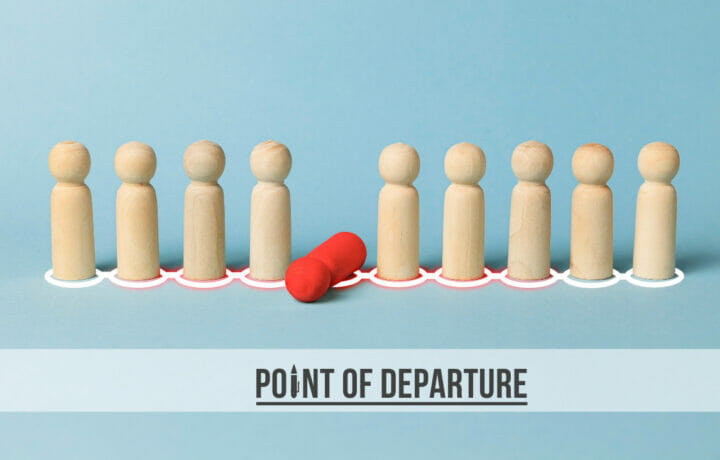“You see the movies; you hear the stories… I’m livin’ the dream.”
The book sits on a shelf in my office, nestled between Dale Carnegie’s classic How to Win Friends and Influence People and the more recent The Subtle Art of Not Giving a F*ck,” from Mark Manson. While both of those books speak volumes about how I think and approach my chosen profession – regardless of what that profession might be in the moment – I’ve been just as influenced by the book that separates the two: Stephen Covey’s timeless work, The 7 Habits of Highly Effective People.
Like many of my peers at the time, I was introduced to Covey’s 7 Habits during a professional development session in early 1990, in the months leading up to our eventual deployment to Saudi Arabia for Operation Desert Shield. These monthly sessions typically began and ended with a lengthy – and exhaustive – diatribe about the joys of marathon running from the brigade surgeon. Doc was a lot like the character Colm McCool in Derry Girls – once he started talking, it was almost impossible to shut him up.
So, I lowered my head and pretended to thumb through my copy of 7 Habits. By the time Doc had decided he needed a beer more than we needed to hear the sound of his voice, I’d found more than my fair share of enlightenment in Covey’s book. For a young lieutenant in search of a little professional inspiration, it was an epiphany.
COVEY’s Habits
In The 7 Habits of Highly Effective People, Covey focused on goal achievement though what he called “true north” principles, defining success as a balance of attaining results while still caring about what it took to attain those results. In 7 Habits, he differentiates values (which govern our behavior) from principle (which determine the consequences of behavior), promoting what he termed “the character ethic” that aligned the two.
He presented his thinking as a series of habits along a “maturity continuum” that fostered progression from dependence (needing others to attain your goals) through independence (attaining your goals on your own) to interdependence (attaining goals as a true team). Once someone had matured to the level of interdependence, it was time to “sharpen the saw” of continuous improvement. As a deeply goal-oriented lifelong learner, 7 Habits struck a nerve.
The 7 Habits of Highly Ineffective Staff Officers
Then reality set in. I could make 7 Habits work for me. I weaved it into the developmental counseling and successfully introduced the ideas to many of my subordinate leaders. But there were still those recalcitrant few for whom the 7 Habits proved elusive. They worked on a different continuum altogether, one that prevented them from ever evolving beyond what Covey termed “dependence.” They seemed to consistently convey a “me” attitude: What can you do for me? How are you taking care of me? What’s in it for me?
They had their own set of habits that, rather than foster their own growth, left them in a constant state of developmental limbo. They didn’t grow. They didn’t get better. They didn’t learn. Those habits were unsurprisingly consistent, regardless of who they were or the organizations they served.
1. Lateness
Legendary UCLA basketball coach John Wooden preached timeliness as a key to success. “Never be late” was one of his three bedrock rules for his players, who won ten NCAA titles in eleven years. Ineffective staff officers are habitually late. They consistently leave others waiting for them.
2. Lack of attention to detail
Details matter. When you’re in a position of leadership, you count on timely, factual information to make critical decision. You won’t get either from an ineffective staff officer. And if you’re basing your decisions on their input, you’re going to be in a world of hurt.
3. Inability to focus
Ineffective staff officers often recognize how others perceive them and like to present themselves as overtasked and persistently busy. They portray themselves as habitual multitaskers when, if fact, they lack any ability to focus on a single task at any given time.
4. Procrastination
If you wait until the last minute to do something, it only takes a minute. And the quality – or lack of it – shows. But don’t let that get in the way of perpetual mediocrity.
5. Impatience
Despite their own bad habits with respect to time, the highly ineffective staff officer has zero patience for others. When they decide to get busy, they want everything done NOW! They expect others to rush to the finish line, as if they have been waiting on everyone else the whole time.
6. Complaining
A certain amount of venting is normal. With the ineffective staff officer, complaining is a way of life. They make enemies of higher staffs, subordinate organizations, peers, superiors, and anyone and everything that they can blame for their own ineffectiveness. If they spent half as much time working as they did whining… well, they wouldn’t be ineffective, would they?
7. Inflexibility
Highly ineffective staff officers aren’t just resistant to change, they don’t see any need for it, especially when it comes to themselves. They dig in their heels and fight like hell to maintain their personal status quo.
It’s Like Herding Cats
Put all of this together and, to be completely honest, it’s a fairly typical day on any staff. There’s a reason why I’ve always viewed staff leadership as something closely resembling cat herding. “Anybody can herd cattle,” but pulling together the staff to get meaningful work done in a finite amount of time, “that’s another thing altogether.”




